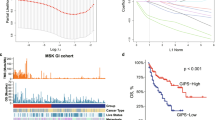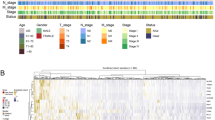Abstract
Immunomodulator-targeting therapies are under development in gastric cancer (GC). However, the role of genes modulating anti-tumor immunity in GC remains poorly understood. We investigated the association of variations in genes involved in immunomodulatory pathways with overall survival (OS) in locoregional GC patients. Extracted genomic DNA was analyzed for 35 functional single-nucleotide polymorphisms in genes, PDCD1, CD274, CTLA4, FOXP3, LAG3, ADORA2A, NT5E and IDO1, in 162 Japanese patients as discovery set and 277 US patients as validation set. The C allele of PDCD1 rs10204525 had univariate and multivariable associations with shorter OS in Japanese cohort (P=0.015, P=0.043, respectively). In US cohort the C allele predicted worse OS (P=0.007). Univariate and multivariable analyses revealed IDO1 rs9657182 associated with OS in the Japanese cohort; moreover, the association was confirmed in the US cohort. Genetic predisposition of the host in the immunomodulators may serve as a prognostic biomarker in patients with locoregional GC.
This is a preview of subscription content, access via your institution
Access options
Subscribe to this journal
Receive 6 print issues and online access
$259.00 per year
only $43.17 per issue
Buy this article
- Purchase on Springer Link
- Instant access to full article PDF
Prices may be subject to local taxes which are calculated during checkout

Similar content being viewed by others
References
Miska J, Bas E, Devarajan P, Chen Z . Autoimmunity-mediated antitumor immunity: tumor as an immunoprivileged self. Eur J Immunol 2012; 42: 2584–2596.
Dunn GP, Bruce AT, Ikeda H, Old LJ, Schreiber RD . Cancer immunoediting: from immunosurveillance to tumor escape. Nat Immunol 2002; 3: 991–998.
Pardoll DM . The blockade of immune checkpoints in cancer immunotherapy. Nat Rev Cancer 2012; 12: 252–264.
Devaud C, John LB, Westwood JA, Darcy PK, Kershaw MH . Immune modulation of the tumor microenvironment for enhancing cancer immunotherapy. Oncoimmunology 2013; 2: e25961.
Antonia SJ, Larkin J, Ascierto PA . Immuno-oncology combinations: a review of clinical experience and future prospects. Clin Cancer Res 2014; 20: 6258–6268.
Gooden MJ, de Bock GH, Leffers N, Daemen T, Nijman HW . The prognostic influence of tumour-infiltrating lymphocytes in cancer: a systematic review with meta-analysis. Br J Cancer 2011; 105: 93–103.
Sun T, Zhou Y, Yang M, Hu Z, Tan W, Han X et al. Functional genetic variations in cytotoxic T-lymphocyte antigen 4 and susceptibility to multiple types of cancer. Cancer Res 2008; 68: 7025–7034.
Geng Y, Wang H, Lu C, Li Q, Xu B, Jiang J et al. Expression of costimulatory molecules B7-H1, B7-H4 and Foxp3 Tregs in gastric cancer and its clinical significance. Int J Clin Oncol 2014; 20: 273–281.
Network CGAR. Comprehensive molecular characterization of gastric adenocarcinoma. Nature 2014; 513: 202–209.
Lee PH, Shatkay H . F-SNP: computationally predicted functional SNPs for disease association studies. Nucleic Acids Res 2008; 36: D820–D824.
McShane LM, Altman DG, Sauerbrei W, Taube SE, Gion M, Clark GM . REporting recommendations for tumour MARKer prognostic studies (REMARK). Br J Cancer 2005; 93: 387–391.
McShane LM, Hayes DF . Publication of tumor marker research results: the necessity for complete and transparent reporting. J Clin Oncol 2012; 30: 4223–4232.
Munn DH . Blocking IDO activity to enhance anti-tumor immunity. Front Biosci (Elite Ed) 2012; 4: 734–745.
Muller AJ, DuHadaway JB, Jaller D, Curtis P, Metz R, Prendergast GC . Immunotherapeutic suppression of indoleamine 2,3-dioxygenase and tumor growth with ethyl pyruvate. Cancer Res 2010; 70: 1845–1853.
Smith AK, Simon JS, Gustafson EL, Noviello S, Cubells JF, Epstein MP et al. Association of a polymorphism in the indoleamine- 2,3-dioxygenase gene and interferon-alpha-induced depression in patients with chronic hepatitis C. Mol Psychiatry 2012; 17: 781–789.
Schultheis AM, Volz NB, Zhang W, Yang D, Ning Y, Stintzing S et al. Use of genetic variants in immune response genes to predict clinical outcome in mCRC patients treated with cetuximab-based therapy. ASCO Meet Abstr 2013; 31: 3567.
Keir ME, Butte MJ, Freeman GJ, Sharpe AH . PD-1 and its ligands in tolerance and immunity. Ann Rev Immunol 2008; 26: 677–704.
Saito H, Kuroda H, Matsunaga T, Osaki T, Ikeguchi M . Increased PD-1 expression on CD4+ and CD8+ T cells is involved in immune evasion in gastric cancer. J Surgical Oncology 2013; 107: 517–522.
Kim JW, Nam KH, Ahn SH, Park DJ, Kim HH, Kim SH et al. Prognostic implications of immunosuppressive protein expression in tumors as well as immune cell infiltration within the tumor microenvironment in gastric cancer. Gastric Cancer 2014; 19: 42–52.
Eto S, Yoshikawa K, Nishi M, Higashijima J, Tokunaga T, Nakao T et al. Programmed cell death protein 1 expression is an independent prognostic factor in gastric cancer after curative resection. Gastric Cancer 2015; 19: 466–471.
Muro K, Bang Y, Shankaran V, Geva R, Catenacci DVT, Gupta S et al. LBA15A phase 1B study of pembrolizumab (Pembro; MK-3475) in patients (pts) with advanced gastric cancer. Ann Oncol 2014; 25: 1–41.
Nguyen LT, Ohashi PS . Clinical blockade of PD1 and LAG3—potential mechanisms of action. Nat Rev Immunol 2015; 15: 45–56.
Garon EB, Rizvi NA, Hui R, Leighl N, Balmanoukian AS, Eder JP et al. Pembrolizumab for the treatment of non-small-cell lung cancer. N Engl J Med 2015; 372: 2018–2028.
Borghaei H, Paz-Ares L, Horn L, Spigel DR, Steins M, Ready NE et al. Nivolumab versus docetaxel in advanced nonsquamous non-small-cell lung cancer. N Engl J Med 2015; 373: 1627–1639.
Brahmer J, Reckamp KL, Baas P, Crino L, Eberhardt WE, Poddubskaya E et al. Nivolumab versus docetaxel in advanced squamous-cell non-small-cell lung cancer. N Engl J Med 2015; 373: 123–135.
Rizvi NA, Hellmann MD, Snyder A, Kvistborg P, Makarov V, Havel JJ et al. Cancer immunology. Mutational landscape determines sensitivity to PD-1 blockade in non-small cell lung cancer. Science 2015; 348: 124–128.
Le DT, Uram JN, Wang H, Bartlett BR, Kemberling H, Eyring AD et al. PD-1 blockade in tumors with mismatch-repair deficiency. N Engl J Med 2015; 372: 2509–2520.
Shah MA, Khanin R, Tang L, Janjigian YY, Klimstra DS, Gerdes H et al. Molecular classification of gastric cancer: a new paradigm. Clin Cancer Res 2011; 17: 2693–2701.
Kohler C, Adegnika AA, Van der Linden R, Agnandji ST, Chai SK, Luty AJ et al. Comparison of immunological status of African and European cord blood mononuclear cells. Pediatr Res 2008; 64: 631–636.
Huang RY, Eppolito C, Lele S, Shrikant P, Matsuzaki J, Odunsi K . LAG3 and PD1 co-inhibitory molecules collaborate to limit CD8+ T cell signaling and dampen antitumor immunity in a murine ovarian cancer model. Oncotarget 2015; 6: 27359–27377.
Acknowledgements
We thank the Dhont Family Foundation and San Pedro Peninsula Cancer Guild that partly funded this study. We also thank the Conquer Cancer Foundation of the American Society of Clinical Oncology and the 2014 Scientific Program Committee for assistance with Y Sunakawa to attend the 2014 ASCO Annual Meeting in Chicago, Illinois, for presentation of current study. S Stremitzer is the recipient of an Erwin Schrödinger fellowship from the Austrian Science Fund. MD Berger received a grant from the Swiss Cancer League (BIL KLS-3334-02-2014). S Stintzing was supported by a postdoctoral fellowship from the German Cancer Aid (the Mildred-Scheel Foundation). A Sebio is the recipient of a Rio Hortega Research Grant from the Insituto de Salud Carlos III (CM11/00102). This study was partly funded by the the National Cancer Institute and award number P30CA014089. The content is solely the responsibility of the authors and does not necessarily represent the official views of the National Cancer Institute or the National Institutes of Health.
Author information
Authors and Affiliations
Corresponding author
Ethics declarations
Competing interests
The authors declare no conflict of interest.
Additional information
Supplementary Information accompanies the paper on the The Pharmacogenomics Journal website .
PowerPoint slides
Rights and permissions
About this article
Cite this article
Sunakawa, Y., Cao, S., Volz, N. et al. Genetic variations in immunomodulatory pathways to predict survival in patients with locoregional gastric cancer. Pharmacogenomics J 17, 528–534 (2017). https://doi.org/10.1038/tpj.2016.46
Received:
Revised:
Accepted:
Published:
Issue Date:
DOI: https://doi.org/10.1038/tpj.2016.46
This article is cited by
-
Evaluation of the possible association of PDCD-1 and LAG3 gene polymorphisms with hepatocellular carcinoma risk
BMC Medical Genomics (2023)



